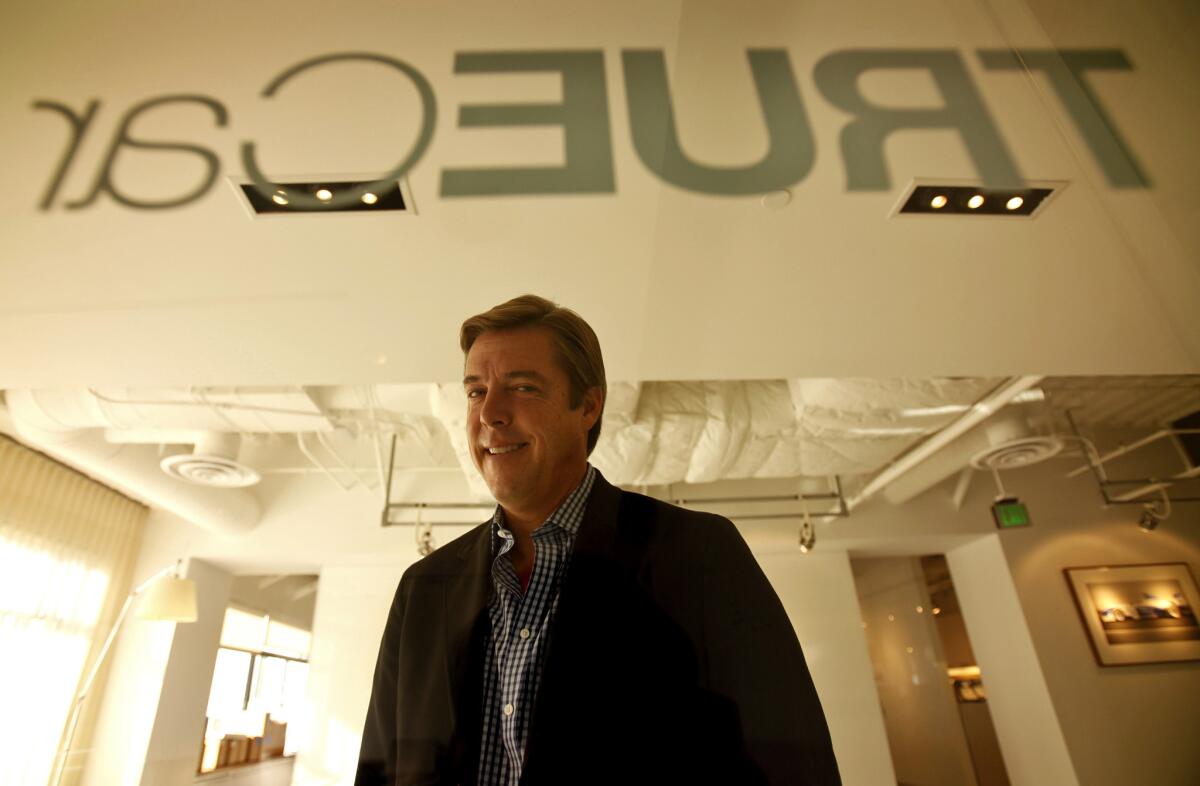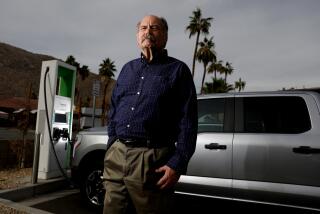California auto dealers’ lawsuit contends TrueCar violates sales laws

Scott Painter is founder and CEO of TrueCar Inc. A California auto dealers group has filed a lawsuit against the Santa Monica car sales service company, claiming its business model violates state regulations.
The California New Car Dealers Assn. filed a lawsuit against the fast-growing TrueCar auto sales service, claiming the Santa Monica company violates various laws that govern car sales in the state.
The suit, filed in Los Angeles County Superior Court on Wednesday, claimed that TrueCar acts as a dealer and broker in car sales transactions but doesn’t have the proper licensing for the business.
“Either they should get licensed or stop doing business,” said Patricia Glaser, attorney for the car dealers group.
The lawsuit is part of an ongoing battle between the dealer group and TrueCar. Last year, the group distributed a memorandum outlining potential legal risks of working with TrueCar, a move analysts saw as trying to discourage dealers from doing business with the company. Dealers have complained that TrueCar increases price competition and eats into their profits.
“TrueCar is an extreme manifestation of the fears dealers have of the Internet,” said Jeremy Anwyl, an auto industry consultant and former chief executive of Edmunds.com, also a digital car information company.
About 80% of car buyers now use third-party websites such as Edmunds and TrueCar to research prices and other information, according to J.D. Power, an auto industry research firm.
Dealers are embracing the Internet in varying degrees. Some continue to work to get buyers to showrooms and enter into on-site price negotiations. Others such as AutoNation, the largest U.S. retailer of new cars, are transitioning from old-school haggling in favor of an online storefront and set pricing on new and used cars.
Anwyl questioned why the dealer group was bringing the lawsuit when possible violations of car sales regulations would normally be prosecuted by state officials.
Moreover, if TrueCar is violating state regulations, so are the more than 600 California dealerships that work with the company, said one auto industry attorney who reviewed the lawsuit but was not authorized to comment. The lawsuit increases the legal risk for such businesses, many of which are members of the California New Car Dealers Assn., he said.
TrueCar operates a digital platform that allows people to search for specific models and generate bids from dealers. It advertises itself as an upfront service that removes distasteful haggling from the car buying process. The company says its customers generally purchase cars for thousands of dollars below manufacturer-suggested pricing.
The shopping service charges dealers a fee for each sale — $299 for a new car, and $399 for a used car. In some states, including California, it charges a monthly subscription fee that roughly translates to those rates. It is that subscription fee that generated the legal challenge. State law dictates that consumers get a disclosure that outlines whether they or a dealer are paying a fee to a broker.
TrueCar doesn’t generate such disclosures because it claims it is not acting as an agent for either party. TrueCar doesn’t take part in negotiations, said Johnny Stephenson, TrueCar chief risk officer. Rather, it serves as a neutral communications platform between dealers, who set their own prices, and consumers.
“How we get paid has nothing to do with whether we are a broker or dealer,” Stephenson said, adding that the state’s Department of Motor Vehicles has reviewed TrueCar’s operations and has not spotted a violation of the agency’s regulations.
The DMV didn’t respond to a request for comment.
Other car shopping websites, such as Edmunds and Kelley Blue Book, get paid for customer leads and advertising. Fees aren’t linked to the number of cars sold via the sites.
Founded in 2005, TrueCar generated $206.6 million in revenue last year but lost $48.4 million. It says it was involved in 3.5% of car sales nationally, after subtracting sales to government and commercial users, such as the rental car companies. The company has 10,000 dealers in its network, including 649 California new car dealerships.
Glaser said both consumers and dealers will benefit from a court ordering TrueCar to register as an auto broker and dealer. The regulations, for example, prohibit dealers from advertising invoice pricing. The TrueCar tool, however, prominently displays a vehicle’s invoice price, as well as what other people have paid for the vehicle and the sticker price.
“So-called technology advances do not permit ignoring the law,” Glaser said. “Quite simply, it is only acceptable to offer new services to consumers if those meet the legal structure in place, which was created to protect consumers. TrueCar, like the rest of us, must follow the law.”
Anwyl questioned the dealer group’s claim that it is protecting consumers. Services such as TrueCar have made car price information more freely available to consumers, improving their ability to negotiate lower prices, he said.
“The lawsuit is in theory to protect consumers, but this association’s mandate is to protect dealers,” Anwyl said. “In practice I am not sure what consumers need to be protected from.”
Follow me on Twitter (@LATimesJerry), Facebook and Google+.







